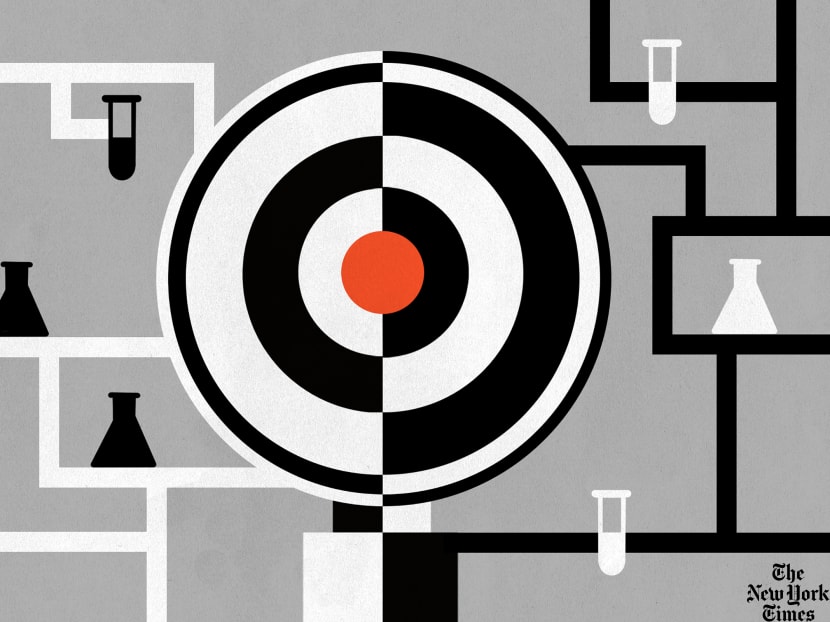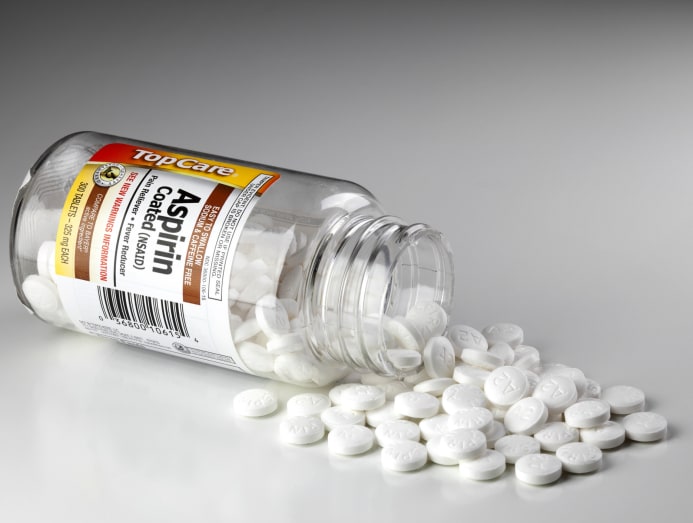Is the new aspirin advice another medical flip-flop, or just science?
Advertisement
Wellness
Is the new aspirin advice another medical flip-flop, or just scientific discipline?
Medical reversals about menopause hormones, articulatio genus surgery and vitamins over the years accept left patients confused. But doctors say these pivots often are good medicine.

(Art: The New York Times/Franziska Barczyk)
When it comes to preventive health, few tenets are as entrenched as daily aspirin. For more than 30 years, many people have relied on the hurting reliever for added protection against a first center assail or stroke.
And so it came every bit a shock to many this month when an influential good panel, the US Preventive Services Task Force, seemed to opposite decades of medical practice, announcing that daily low-dose aspirin should no longer be automatically recommended in middle age to prevent heart attack.
"It was almost like a vitamin to some people," said Dr Eric Topol, a cardiologist and professor of molecular medicine at Scripps Enquiry in La Jolla, Calif.
At a time when many people already experience whipsawed by shifting pandemic advice (on masks, viral transmission and booster shots), the new aspirin recommendations left some shaking their heads.

"Await long plenty, and smoking and heavy cream volition exist proficient for y'all," Richard Koss, an economist in New York, wrote in a annotate after reading nearly the new guidelines. "The vast majority of people are fed upwards with this sort of thing and, rightly, pay information technology no attention."
But experts say it should be reassuring to patients to know that fifty-fifty the most trusted medical guidelines are being reviewed and updated as scientific agreement evolves.
"It seems like it happens overnight, but this is how science works," Dr Sophie M Balzora, a gastroenterologist at NYU Langone Health, said. "If nosotros had the same guidelines all the time, then the question would be: Are we really advancing scientific discipline? Are we really learning more?"
A HISTORY OF MEDICAL FLIP-FLOPS
Shifting medical advice is surprisingly common, and it tends to autumn into three categories: Emerging guidance, replacement advice and reversals.
Emerging guidance comes during times of crisis – like pandemics – and is destined to change quickly. In the past several months, guidance about the best mode to treat COVID-19 patients, masks to prevent transmission and the limits of vaccine protection have all shifted every bit cognition of the coronavirus and its variants has evolved.
Sometimes it's hard to tell the divergence between replacement communication, which is issued when inquiry improves on advice that came before it, and a total reversal, which comes about considering a common medical practise got ahead of the science and never actually worked or fifty-fifty caused impairment. Hither are some examples of truthful medical flip-flops in recent years.

■ Menopause hormones to protect the center: In 2002, decades of advice almost the eye benefits of menopause hormones seemed to change overnight when a major report called the Women's Wellness Initiative was halted later researchers detected more heart attacks in the women taking hormones. In hindsight, doctors had misinterpreted data from observational research. The current advice: Hormones can salvage menopause symptoms only shouldn't be used for chronic illness prevention.
■ Vioxx as a lower-hazard arthritis handling: In 1999, the Food and Drug Administration approved Vioxx as a breakthrough hurting reliever because information technology lowered the risk of gastrointestinal problems. But past 2004, Merck had withdrawn the drug considering studies showed it significantly raised the risk of heart assault.
■ Arthroscopic surgery on crumbling knees: For years, the partial removal of torn meniscus tissue was the virtually common orthopedic process in the Usa, with about 700,000 performed a year. In 2013, a researcher in Republic of finland compared the operation to a "sham" process and found there was no benefit. About doctors now recommend physical therapy instead.
■ Vitamin megadoses to lower cancer and heart risk: For years, doctors believed various vitamins could lower take chances for cancer and centre disease, simply a number of studies showed only the opposite. A written report of beta carotene and vitamin A found that the supplements actually increased the risk of lung cancer in male smokers. A study of vitamin E and selenium, idea to protect confronting prostate cancer, increased risk for the illness.
■ Stents for stable heart disease: Doctors used to insert stents – tiny wire mesh tubes that prop open arteries – in millions of otherwise stable patients with centre illness. A study plant that the surgical procedure was no meliorate than drug therapy for preventing heart attacks.
While daily aspirin tin can lower run a risk of centre attack or stroke, it tin also increase risk for internal bleeding.
Dr Vinay Prasad, acquaintance professor at the University of California San Francisco, and Dr Adam S Cifu, a professor of medicine at the University of Chicago Department of Medicine, coined the term "medical reversal" and ended that near twoscore per cent of common medical practices that they reviewed turned out to exist useless or harmful. In their book, "Ending Medical Reversal: Improving Outcomes, Saving Lives," they noted that most of these failed treatments were initially embraced because they were based on logical reasoning.
"The thing that's often behind reversal: All of these things have a practiced story, they have good pathophysiological rationale," Dr Cifu said. "They should work. But things but piece of work if they've been shown in people to piece of work, and people are so complicated."
THE REASON ASPIRIN Communication CHANGED

While daily aspirin tin can lower risk of center attack or stroke, it can also increase risk for internal bleeding. Although the absolute risk of a bleeding upshot is relatively low, the hazard increases with historic period.
Several experts say the new guidance from the Preventive Services Task Force to curb aspirin utilise is non a truthful medical reversal and should be viewed every bit updated advice replacing outdated guidance, which is why the panel exists in the first identify. Earlier this year, the task force lowered the historic period of regular colonoscopy screening to 45, down from 50. The panel acquired an uproar several years ago when it recommended that women start breast cancer screening at historic period 50, instead of forty.
"The task strength is simply constantly re-evaluating based on what data were bachelor," Dr Barron H Lerner, a medical historian and professor of medicine at NYU Langone, said. "This might be seen as flip-flopping, only it is really making adjustments based on the evolving scientific discipline."
For people who accept had a heart assail, stroke or other major cardiovascular issue, the example for using aspirin to protect them from a 2nd event remains strong. The new Preventive Services Task Force guidelines don't change that advice.
What has inverse is the guidance for using aspirin to forbid a first heart attack or stroke.
The early on testify in support of aspirin to protect the middle came in 1988 from a randomised controlled clinical trial of 22,071 male person physicians, some of whom took regular doses of aspirin. The written report was stopped early on because the benefit in the aspirin group was and then drastic – cutting center attack risk by nearly one-half.
As a result of the doc study and other research, the task strength began updating its aspirin advice. In 2002, the console was cautious, urging patients to talk to their doctors. Just past 2016, the chore strength had recommended depression-dose aspirin for adults 50 to 59 at risk of eye problems.
But in the years since the early inquiry showed such a striking do good to aspirin apply, much most the population has inverse. Fewer people smoke, and doctors have better treatments to control diabetes, high claret pressure level and cholesterol, problems that all affect risk for heart assail and stroke. Aspirin still works to protect the heart, just doctors say the benefits aren't as pronounced now that other more effective treatments have emerged. As a upshot, the risks of aspirin, including gastrointestinal bleeding and brain hemorrhage, are of greater concern, though they remain low.
Three major studies of aspirin influenced the task force communication this year.
■ A 2022 study of more than 19,000 healthy people 65 and older showed that regular low-dose aspirin use significantly raised bleeding risk and didn't significantly lower risk of center problems compared with a placebo.
■ A 2022 report of aspirin use in 15,480 people with diabetes found a do good to the middle simply also a significant bleeding take a chance.
■ A seven-land written report of aspirin utilize in 12,546 moderate-hazard people in their 50s and 60s was inconclusive, well-nigh likely considering other prevention strategies were muting the effect of aspirin.
As a consequence, the task force this calendar month said that people lx and older should definitely not start taking aspirin to prevent a get-go heart assault or stroke. For people ages forty to 59, the task force suggested discussing the risks and benefits with a medico.
"At that place is new evidence, and it's well-nigh how we put all the evidence together and apply information technology to people today. How practice nosotros use information technology to the U.s.a. population in 2021?" said Dr Chien-Wen Tseng, a fellow member of the job force and inquiry director at the University of Hawaii John A Burns Schoolhouse of Medicine.
Dr Cifu said the revised aspirin guidelines were a sign that the job force review procedure was working and should requite people more confidence in the communication.
"Things that we knew were correct in the tardily '80s early '90s need to exist rechecked to see if they're yet right, given that we're all quite different than 30 years agone," Dr Cifu said. "Information technology'south a niggling uncomfortable that things don't stay the same forever, just it's good that medicine is checking itself."
Dr Tseng said she hoped the new guidance near aspirin would prompt more people to talk to their doctors about their middle health.
"Ane of the key messages nosotros need to get out is that aspirin isn't like a vitamin," Dr Tseng said. "There are potential benefits and potential risks. Everybody should be having a chat with their clinician instead of only opening a canteen and taking aspirin automatically because they've reached a certain historic period."
By Tara Parker-Pope © New York Times Company
This commodity originally appeared in The New York Times.
Source: New York Times/yy
Recent Searches
Trending Topics
echevarriaanterevell.blogspot.com
Source: https://cnalifestyle.channelnewsasia.com/wellness/new-aspirin-advice-another-medical-flip-flop-or-just-science-286126

0 Response to "Is the new aspirin advice another medical flip-flop, or just science?"
Post a Comment